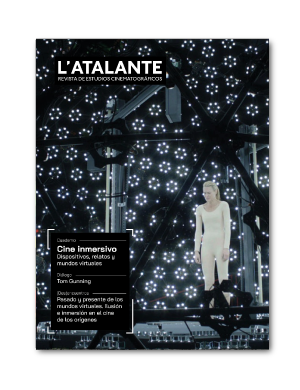El rostro que fulgura. Una redefinición del concepto de fotogenia desde el cine contemporáneo
Publicades 2023-01-01
Paraules clau
- Rostro,
- Fotogenia,
- Anacronismo,
- Cine digital,
- Cine de los orígenes
- Imagen dialéctica,
- Jean Epstein. ...Més
Com citar
Resum
Según indica Francesco Casetti (2005), existe un primer período de las teorías del cine, el de las así llamadas teorías clásicas, que llega aproximadamente hasta la década de los cuarenta del siglo XX, durante el cual se desarrollan una serie de discursos que tratan de proporcionar a la imagen cinematográfica una forma de pensamiento que le sea propia. Entre ellos, se encuentran las primeras reflexiones sobre el tema del rostro en el plano. El presente artículo toma como referencia los escritos de algunos de estos autores —en especial, los textos de Jean Epstein sobre la fotogenia— para empezar a analizar la cuestión del rostro humano tal y como se reaviva en el cine contemporáneo, en el contexto de la imagen digital. Al amparo del pensamiento dialéctico de Walter Benjamin, que ofrece conceptos tan exuberantes como relampagueo y fulgor, las páginas de este texto pretenden trazar líneas que conecten los rostros de la contemporaneidad con el cine de los orígenes.
Descàrregues
Referències
Agamben, G. (2010). <em>Ninfas</em>. Valencia: Pre-Textos.<br>
Agamben, G. (2008) <em>¿Qué es lo contemporáneo? </em>https://19bienal.fundacionpaiz.org.gt/wp-content/uploads/2014/02/agamben-que-es-lo-contemporaneo.pdf <br>
Auerbach, E. (1998). <em>Figura</em>. Madrid: Trotta.<br>
Aumont, J. (1998). <em>El rostro en el cine</em>. Barcelona: Paidós.<br>
Baudrillard, J. (2006). <em>El crimen perfecto</em>. Barcelona: Anagrama.<br>
Benjamin, W. (1998). <em>Iluminaciones I</em>. Madrid: Taurus.<br>
Benjamin, W. (2006). Materiales preparatorios del escrito «Sobre el concepto de historia». En R. Mate, <em>Medianoche en la historia. Comentarios a las tesis de Walter Benjamin «Sobre el concepto de historia» </em>(pp. 305-325). Madrid: Trotta.<br>
Benjamin, W. (2012). <em>El París de Baudelaire</em>. Buenos Aires: Eterna Cadencia.<br>
Calabrese, O. (1990). <em>La era neobarroca</em>. Madrid: Cátedra.<br>
Casetti, F. (2005). <em>Teorías del cine</em>. Madrid: Cátedra.<br>
Cherchi Usai, P. (2005). <em>La muerte del cine</em>. Barcelona: Laertes.<br>
De Felipe, F., Gómez, I. (2014). <em>El sueño de la visión produce cronoendoscopias: Tratamiento y diagnóstico del trampantojo digital</em>. Barcelona: Laertes.<br>
Didi-Huberman, G. (2006). <em>Ante el tiempo</em>. Buenos Aires: Adriana Hidalgo.<br>
Didi-Huberman, G. (2015a). <em>Ensayos sobre la aparición 1. Falenas</em>. Santander: Shangrila.<br>
Didi-Huberman, G. (2015b). <em>Ensayos sobre la aparición 2. Fasmas</em>. Santander: Shangrila.<br>
Didi-Huberman, G. (2009). <em>La imagen superviviente. Historia del arte y tiempo de los fantasmas según Aby Warburg</em>. Madrid: Abada Editores.<br>
Epstein, J. (2021). <em>Escritos sobre cine (1921-1953)</em>. Santander: Shangrila.<br>
Morin, E. (2001). <em>El hombre imaginario</em>. Barcelona: Seix Barral.<br>
Proust, M. (1990). <em>En busca del tiempo perdido. A la sombra de las muchachas en flor.</em> Madrid: Aguilar.<br>
Rancière, J. (2018). <em>Tiempos modernos. Ensayos sobre la temporalidad en el arte y la política</em>. Santander: Shangrila.<br>
Romaguera i Ramio, J., Alsina Thevenet, H. (eds.) (1989). <em>Textos y manifiestos del cine</em>. Madrid: Cátedra. <br>
Sánchez, S. (2013). <em>Hacia una imagen no-tiempo. Deleuze y el cine contemporáneo</em>. Oviedo: Universidad de Oviedo.<br>
Stam, R. (2001). <em>Teorías del cine. </em>Barcelona: Paidós.<br>
Virilio, P. (1988). <em>Estética de la desaparición</em>. Barcelona: Anagrama.<br>
Wall-Romana, C. (2016). <em>Jean Epstein</em>. Manchester: Manchester University Press.</p>

